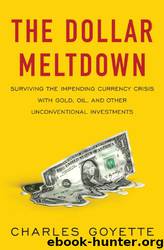The Dollar Meltdown by Charles Goyette

Author:Charles Goyette
Language: eng
Format: epub
Publisher: Penguin USA, Inc.
CHAPTER NINE
The Authorities Are in Charge
Or So They Think!
. . . if we face a monopolist we are at his mercy. And an authority directing the whole economic system would be the most powerful monopolist conceivable.
—F. A. Hayek
The more prohibitions there are, the poorer the people become. . . .
The greater the number of statutes, the greater the number of
thieves and brigands.
—Lao-tzu
The Command Economy
America is transforming itself, without forethought, debate, or pause, into a command economy. A command economy is a top-down, state-controlled economy directed by planners and bureaucrats, boards and bodies, administrators and authorities. A command economy is not characterized by mutuality of interest and agreement between parties. It relies on edict. A command economy, as the name implies, orders the affairs of a nation by coercion. In a free economy goods and services are bought and sold by consent; business transactions are based on agreement; contracts depend upon a meeting of the minds of the parties involved. In a command economy government sets prices, controls and directs resources, and oversees production and consumption. Free economies produce prosperity; command economies produce poverty. The transformation of America is already taking place at breakneck speed, even before the current economic crisis is full blown. Historical precedents insist that as conditions worsen, the transformation into a command economy will accelerate.
It is astonishing that this should be taking place, especially at a time in which three billion people around the globe have rejected the poverty, want, and shortages of their command economies to begin to experience the blessings of abundance. It is not as though object lessons are wanting. China’s stunning economic growth, its modernization and rising living standards are the result of nothing more complicated than freeing the command economy. Although lessons abound, Americans are choosing—or perhaps failing to choose and therefore letting the choice be made for them—to go in much the same direction as the command economy of postwar Great Britain. That period saw the nationalization of entire sectors of the British economy, a currency crisis and prolonged economic decline including crippling unemployment and choking inflation. The reasons that the United States would choose to follow a pattern that hollows out economies the way it did the British are many. But as a symptom, although not a cause of this self-inflicted harm, look to the modern American politician. For today’s breed of politician, power is their very passion. Their every concern and the entire public debate about politicians centers around the use of power. How may power best be exploited and aggrandized? Who is to be bailed out, who is to be plundered to pay for it? Who is to be subsidized, who penalized? Who shall be taxed and who shall be paid? In contrast, the founders looked upon power very differently: How can the use of power be limited? How can it be divided against itself? How can it be kept in check? In yielding to the former and to their command economy, the current generation of Americans, blessed with so much, will be the shame of the ages.
Download
This site does not store any files on its server. We only index and link to content provided by other sites. Please contact the content providers to delete copyright contents if any and email us, we'll remove relevant links or contents immediately.
Rich Dad Poor Dad by Robert T. Kiyosaki(6632)
Pioneering Portfolio Management by David F. Swensen(6300)
How To Win Friends and Influence People by Dale Carnegie(4513)
The Money Culture by Michael Lewis(4207)
The Dhandho Investor by Mohnish Pabrai(3765)
The Wisdom of Finance by Mihir Desai(3747)
Liar's Poker by Michael Lewis(3449)
Fooled by Randomness: The Hidden Role of Chance in Life and in the Markets by Nassim Nicholas Taleb(3124)
The ONE Thing by Gary Keller(3071)
Mastering Bitcoin: Programming the Open Blockchain by Andreas M. Antonopoulos(3045)
The Intelligent Investor by Benjamin Graham Jason Zweig(3041)
The Psychology of Money by Morgan Housel(3036)
Rich Dad Poor Dad: What The Rich Teach Their Kids About Money - That The Poor And Middle Class Do Not! by Robert T. Kiyosaki(2958)
Investing For Dummies by Eric Tyson(2954)
How to Day Trade for a Living: Tools, Tactics, Money Management, Discipline and Trading Psychology by Andrew Aziz(2949)
How to Win Friends and Influence People by Dale Carnegie(2915)
Market Wizards by Jack D. Schwager(2700)
How to Pay Zero Taxes, 2018 by Jeff A. Schnepper(2655)
Zero Hour by Harry S. Dent Jr. & Andrew Pancholi(2647)
